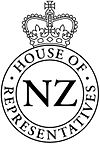Member of the New Zealand House of Representatives
| New Zealand House of Representatives | |
|---|---|
| 51st New Zealand Parliament | |
 |
|
| Type | |
| Type | |
| Leadership | |
|
Leader
|
|
| Structure | |
| Seats | 121 |
 |
|
|
Political groups
|
Government
Supported by (4)
Opposition (58) |
| Elections | |
| Closed list Mixed-member proportional representation | |
|
Last election
|
20 September 2014 |
|
Next election
|
23 September 2017 |
| Meeting place | |
| Parliament House, Wellington | |
| Website | |
| www.parliament.nz | |
| Footnotes | |
| ^ a. The National Government has confidence and supply agreements with ACT, the Māori Party and United Future. | |
Government
Supported by (4)
Opposition (58)
The New Zealand House of Representatives is the sole chamber of the legislature of New Zealand. The House and the Queen of New Zealand together constitute the New Zealand Parliament. The House of Representatives passes all laws, provides ministers to form a cabinet, and supervises the work of the Government. It is also responsible for adopting the state's budgets and approving the state's accounts.
The House of Representatives is a wholly democratically elected body, usually consisting of 120 members (currently 121 due to an overhang) known as Members of Parliament (MPs). Members are elected for limited terms, holding office until Parliament is dissolved (a maximum of three years). A government is formed from the party or coalition with the majority of MPs. If no majority is possible then a minority government can be formed with a confidence and supply arrangement.
The chamber was created by the British New Zealand Constitution Act 1852, which established a bicameral legislature; however the upper chamber, the Legislative Council, was abolished in 1951. Parliament received full control over all New Zealand affairs in 1947 with the passage of the Statute of Westminster Adoption Act.
...
Wikipedia
